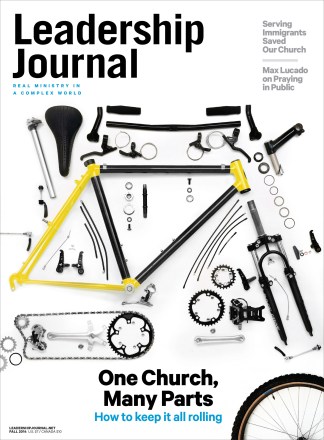Thirty years ago I was a 20-something pastor, green as a sapling, standing in a 100-year-old pulpit dense with ancient oak. Weekly I addressed people who, on average, were 40 years my senior. They were good people, kind and generous. They nurtured me well in my first bumbling years of pastoral ministry. I still feel a deep affection for them and owe them a great debt.
But without anyone even noticing it, we had become a clique. G.K. Chesterton wrote: "The man who lives in a small community lives in a much larger world. He knows much more of the fierce variety and uncompromising divergences of men." We may have been a small community, but we knew little of "fierce variety and uncompromising divergences." What we knew—what marked us out—was sameness and conformity. We attracted people much like ourselves. We felt awkward whenever someone different from us wandered in. And they felt awkward, too—and soon left.
I observed this, but never confronted it. It haunted me.
Six years later, I took another pastorate in a town where fierce variety and uncompromising divergences could not be avoided. It helped immensely that my predecessor sought and welcomed people on the margins. He was a "highways and byways" pastor, always on the hunt for the least of these, and leaping with childlike joy whenever a one of them came stumbling through the doors.
And so they came, in droves. The weekend I interviewed at that church, they had a sharing time. One tattoo-slathered woman (in the days when only that kind of woman got tattoos) stood up and, to raucous applause, told everyone she hadn't touched liquor in six months. Then a man stood up and shared that he'd gone three weeks without indulging his sex addiction. Cheers and wild clapping.
I turned to my wife and whispered, "I think we're home."
We stayed 18 years.
That church, that town, was an ongoing crash course in Chestertonian community. There were times when I missed the middle-class tidiness of my old church. This new community was messy all the day long. It was like a city-wide pool of Bethesda: "here a great number of disabled people used to lie—the blind, the lame, the paralyzed" (John 5:3). Add bulimics, alcoholics, drug addicts, sex addicts, the mentally ill, and a host of others, and you've got the picture.
It makes you desperate, God-hungry. You become unwilling to settle for anything less than Jesus' touch, voice, presence. Nothing else will do. Not that I didn't try. I tried managing the mess, isolating from it, bringing in the latest slickest program to deal with it. But slowly Christ changed me. I saw the smallness of my own soul: my territorial defensiveness, my deep love of comfort, my glaring deficiencies of compassion, my fear of the stranger.
I still have so very far to go. But I know this: I was naked and he clothed me; I was thirsty and he gave me something to drink; I was hungry and he fed me; I was in prison and he visited me. And now he keeps showing up in all these same terrible disguises, and bids me find him where I least expect him, where I least want to go.
Mark Buchanan teaches pastoral theology at Ambrose Seminary in Calgary, Alberta.
Copyright © 2014 by the author or Christianity Today/Leadership Journal. Click here for reprint information on Leadership Journal.










